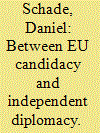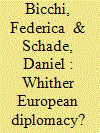|
|
|
Sort Order |
|
|
|
Items / Page
|
|
|
|
|
|
|
| Srl | Item |
| 1 |
ID:
190070


|
|
|
|
|
| Summary/Abstract |
This article considers differentiated cooperation between European Union (EU) member states and third countries in diplomatic statements at the Organization for Security and Cooperation in Europe (OSCE). Using a novel dataset on interventions in OSCE Permanent Council meetings, it analyzes when and why third countries align with the EU's positions. The observed alignment patterns underline the complexity of third country motivations to form part of the EU's diplomatic alliances, such as their institutional proximity to the organization, or their own involvement in regional conflicts. In so doing the article explores the limits of differentiated diplomatic cooperation with the EU in multilateral security organizations. It also points to the constraints the EU faces when trying to establish itself as a relevant player in European and international security through diplomatic acceptance and amplification of its own views by others.
|
|
|
|
|
|
|
|
|
|
|
|
|
|
|
|
| 2 |
ID:
145551


|
|
|
|
|
| Summary/Abstract |
The way in which free movement of people has become the central issue of the British government's renegotiation and referendum campaign on the UK's relationship with the European Union (EU) risks obfuscating at least three central issues: why immigrants are coming to the UK; what impact EU migrants are having on the UK; and what can be done to effectively regulate such inflows. It is, however, not just the eurosceptics and the British government, but also ‘in campaigners’ and other EU member states, who risk perpetuating a number of widely held misconceptions about free movement and immigration for political reasons. Buying into such myths risks undermining attempts to have a more honest and more evidence-based debate about immigration and migrant integration.
|
|
|
|
|
|
|
|
|
|
|
|
|
|
|
|
| 3 |
ID:
184038


|
|
|
|
|
| Summary/Abstract |
The article analyses the evolution of European diplomacy over two decades, to assess the impact of the European External Action Service (EEAS) creation alongside consecutive waves of enlargement. Data is drawn from two original datasets about European Union (EU) member states’ diplomatic representations within the EU and across the globe. It shows that member states have maintained and strengthened their substantial diplomatic footprint across the EU’s territory, expanding it to include new members and making Brussels a diplomatic hub also for non-member countries. In parallel, and despite the establishment of the EEAS, member states have maintained and even increased their networks of diplomatic representations across the globe, alongside more numerous and more politically active EU Delegations (EUDs). At the same time, member states have been reducing their diplomats’ numbers, as the cases of Austria, France, Germany and Italy show. This delicate balancing act has been made possible not only by contemporary technological developments, but also by European cooperation, as in the case of EUDs hosting member states’ representations in non-member countries, a development referred to as co-location. Therefore, whereas the continued presence of national embassies on the ground could be interpreted as detracting from the EEAS, the existence of EUDs contributes also to other, more indirect but certainly novel, forms of diplomatic cooperation under a single European roof.
|
|
|
|
|
|
|
|
|
|
|
|
|
|
|
|
|
|
|
|
|